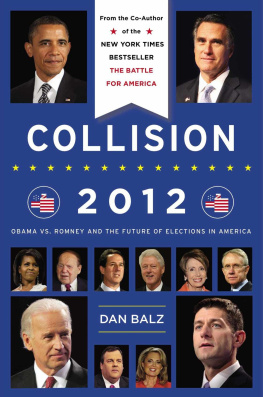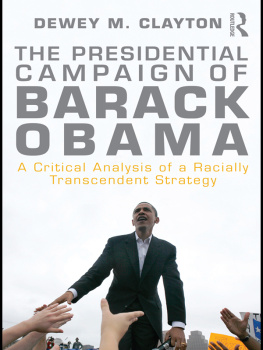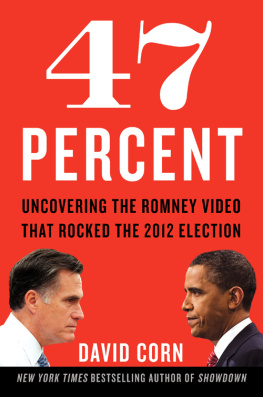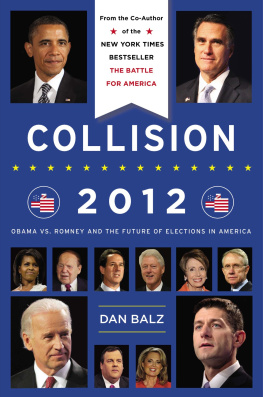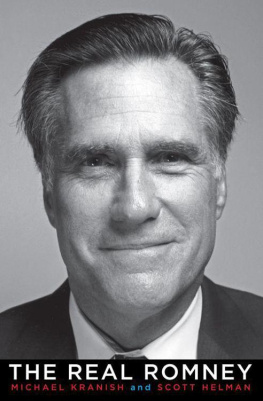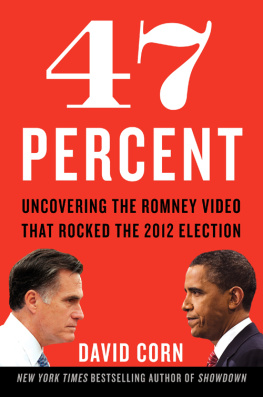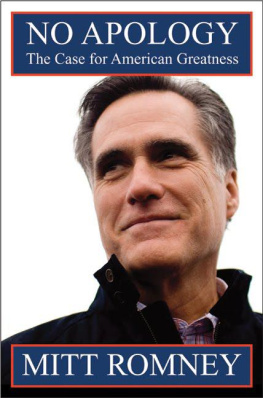Also by Dan Balz
Storming the Gates: Protest Politics and the Republican Revival
(with Ronald Brownstein)
The Battle for America 2008: The Story of an Extraordinary Election
(with Haynes Johnson)
Obama vs. Romney: The Take on Election 2012

VIKING
Published by the Penguin Group
Penguin Group (USA) Inc., 375 Hudson Street,
New York, New York 10014, USA
USA | Canada | UK | Ireland | Australia | New Zealand | India | South Africa | China
Penguin Books Ltd, Registered Offices: 80 Strand, London WC2R 0RL, England
For more information about the Penguin Group visit penguin.com
Copyright Dan Balz, 2013
All rights reserved. No part of this book may be reproduced, scanned, or distributed in any printed or electronic form without permission. Please do not participate in or encourage piracy of copyrighted materials in violation of the authors rights. Purchase only authorized editions.
Grateful acknowledgment is made for permission to use materials previously published in the Washington Post . Copyright 2011, 2012 by the Washington Post.
ISBN 978-1-101-62276-6
While the author has made every effort to provide accurate telephone numbers, Internet addresses, and other contact information at the time of publication, neither the publisher nor the author assumes any responsibility for errors, or for changes that occur after publication. Further, the publisher does not have any control over and does not assume any responsibility for author or third-party Web sites or their content.
In memory of
David S. Broder and Haynes Johnson,
good friends and great colleagues,
who set the standards
for all who follow
And again, to Nancy,
for love and friendship,
and for everything
There is a New America every morning when we wake up. It is upon us whether we will it or not. Adlai E. Stevenson II
Contents
To the Reader
This book is a sequel to one I coauthored with Haynes Johnson about the 2008 election. That campaign was historic in many ways, and as I began this project it seemed unlikely that 2012 could deliver a story as rich or compelling as that one. As it turned out, 2012 was different from 2008 but in its own way just as compelling. The election of 2008 was the story of Barack Obama, the rise of what Johnson and I called the most unlikely presidential prospect in all of American history. The election of 2012 was a sprawling story about a divided America, the unusual cast of characters who sought to lead the country, and the underlying forces that helped determine the outcome. It was not an uplifting campaign by any stretch of the imagination. At times the plain nuttiness of it all cried out for Hunter S. Thompson to chronicle it. But both as political theater and as a window into the struggle between where America has been and where it may be going, it was as engaging as it was instructive about the state of our politics.
This book is based on several hundred interviews that were done over a period of two years. The interviewees included candidates, strategists in and outside the campaigns, citizens, and scholars. Most of the interviews were done on the record, although some of those were embargoed until publication of the book. Others were done with the agreement that the interviewee not be identified. The book is also grounded in my daily reporting and writing for the Washington Post during the course of the campaign. A few passages in the book are drawn directly from that work with the Post s permission.
In so many ways, Campaign 2012 was a departure from what had come before. The basic architecture wasnt that different. For example, the calendar hadnt changed much from years past and still dictated the pace of the action and the movement of the candidates. But candidates were operating in a new environment. More money was spent than ever before. Super PACs taking unlimited contributions became a force. Polls proliferated unlike in any previous campaign. Debates played a more central role than ever. Social media, led by Twitter and Facebook, changed the way campaigns and the media did business. For the candidates, maintaining control of their campaigns in the face of these fast-moving forces was even more of a challenge in 2012 than it had been in earlier elections.
Campaign 2012 was one in which the best of campaign tactics and strategies collided with the immutable forces that do as much to affect the outcome as anything candidates and their advisers may do or say. Economic cycles, demographic shifts, and the hardening of partisan lines shaped this campaign from start to finish. It was almost as if there were two campaigns playing out at oncethe campaign on the surface that captured headlines and drove the commentary, and the subterranean campaign that was little seen but ever powerful.
Keeping track of all this tested the best of strategists, analysts, reporters, and political scientists. It was a campaign about big things but one often fought out in small ways. If 2008 was inspiring, 2012 was often negative and nastybig stakes but not always a campaign to do them justice. By the time it ended, most Americans were ready to say good riddance. And yet from start to finish, it was an extraordinary story about a nation divided in search of its future.
CONTRASTS
The President
December 6, 2011
T he presidential campaign year is set to open in less than a month and President Obama has come to Osawatomie, Kansas. It has been a long year for the presidentendless (and fruitless) budget battles with the Republicans in Congress, unexpected political setbacks that left him in a funk, and, worst of all, a stubborn economy that has not responded well to his policies. Unemployment stands at 8.6 percent. By numbers political strategists watch closely, he is as vulnerable as any president seeking reelection in two decades. His presidency, which began with themes of hope and change, is at risk.
He is no longer the bright and shining politician who captivated the nation four years earlier. The once aspirational candidate of 2008 is now scarred by his battles with a militant and hard-right Republican opposition that has decided to no longer play by the old rules. His presidency has left the country even more deeply polarized than it was under George W. Bush. Many voters recognize the obstacles that Republicans have put in his path, and yet they wonder why this president, who offered so much promise, has not found a way to make the system work. No one is quite sure who he is or what he really wants to fight for.
The president needs a fresh start and a sharper edge. He needs a new way to set the terms for the coming reelection campaign. He has come to Osawatomie because it was where a century earlier President Theodore Roosevelt delivered his famous New Nationalism speech. In this same small town, Roosevelt argued that a strong federal government was necessary to protect ordinary citizens from the destructive power of big corporations.
Obama carries with him the text of a speech that seeks to build on the foundation laid by that trust-busting Republican president. He wants to frame the choice for the 2012 election as one of the biggest in a generation, a collision between competing philosophies about the economy, the role of government, and the well-being of the struggling middle class. He talks about income inequality and says, This is a make-or-break moment for the middle class and all those who are fighting to get into the middle class. Of the Republican approach he says this: It doesnt work. Its never worked.
This Obama is different from the one the country has seen, the assertive progressive many of his followers have been looking for. He has set the terms of the campaign on populist themes, drawing the starkest of contrasts with the Republicans who have countered his every move for three years. He has found the ground on which to run. The day marks the real opening of what will be a high-stakes reelection campaign.
Next page
